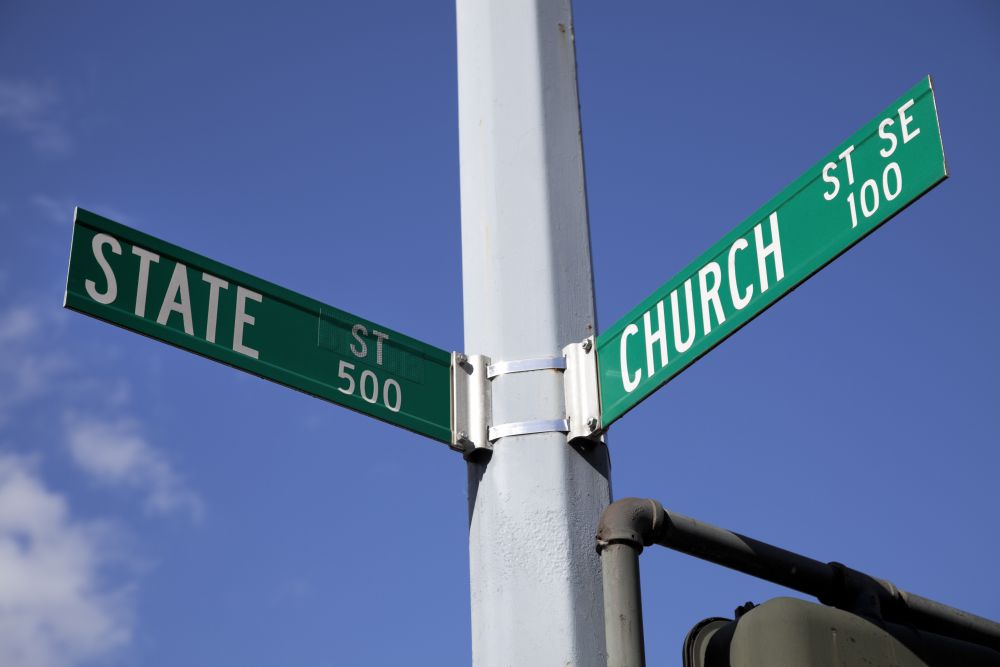
The Definition of Ambiguity

When you hear about a “secular” person, what comes to mind? A non-religious person? An atheist? An agnostic? The truth is, the meaning of secular has evolved over the past 200 years, said Joseph Blankholm, an assistant professor in UC Santa Barbara’s Department of Religious Studies.
Today, secularism in America occupies a continuum punctuated by politics, shifts in Christian affiliation and demographics. Its social fluidity makes it both familiar and enigmatic. Blankholm, who studies atheism and secularism, aims to bring clarity to the subject in “Secularism and Secular People” in the journal Public Culture.
In the paper, Blankholm examines three modern lawsuits by secular groups that ask the court to recognize them in three different ways: religious, not religious and something in between.
“Taken together, these lawsuits demonstrate how American secularism figures and restrains secular Americans,” he wrote. “They also provide useful case studies for thinking beyond the division between secular and religious and recognizing how a more capacious understanding of religion can help explain the religious diversity that one finds within the secular in the United States.”
In the first case, the Freedom From Religion Foundation (FFRF) challenged a law that provides a tax break to ministers who receive a housing allowance as part of their pay. The FFRF argued its secular co-directors should receive the same tax break, the total value of which was estimated at $700 million in 2014.
Curiously, attorneys for the federal government argued that the FFRF’s leaders would likely receive the housing allowance if they applied for it because the IRS would consider them “ministers of the gospel” as they “engage in the profusion of certain beliefs” that resemble religious doctrine. Though a federal judge found this argument “difficult to take … seriously,” an appeals court agreed with the government attorneys, ruling that FFRF didn’t have standing for its suit because it didn’t apply for the tax exemption.
As Blankholm noted, the case highlights the fragility of the boundary between secular and religious. FFRF works as hard as any group in America to be secular and argue for secularism, he said, but this very dedication opens it up to the risk of being considered religious in the eyes of the law.
A broad definition of religion makes it especially hard for secular people to avoid. For instance, those who form communities, even for self-advocacy, run the risk of being too religious by their own standards. “You want to do religion-like things, maybe, but you can’t, because your whole identity has been framed in a Christian understanding of the world in which you’re not religious,” said Blankholm, who maintains a database of roughly 1,500 secular groups in the U.S. “That’s a fundamentally ambivalent condition.”
In the second case, the American Humanist Association (AHA) took a different tack. It argued that it was a secular religious minority in a lawsuit that challenged the inclusion of “under God” in the Pledge of Allegiance — a two-word phrase that wasn’t added until 1954.
Though it considers itself non-theistic, the AHA emphasizes its positive, humanistic identity, which is “a broader religious view that includes an affirmative naturalistic outlook; an acceptance of reason, rational analysis, logic, and empiricism as the primary means of attaining truth …”
American courts have long recognized non-theistic humanists as religious, and although the AHA ultimately lost, the courts made clear they considered the group to be a religious minority. Its case, Blankholm wrote, “confronts the specialness of religion without attacking it head on. Unlike FFRF, which aims to revise legal secularism so that it recognizes no distinction between secular and religious, AHA undermines the law’s ability to distinguish between secular and religious by making itself both and by demanding that the law’s working definition of religion be capacious enough to contain it …”
In the third case, the Center for Inquiry (CFI) successfully argued that the courts should recognize “that it is like a religious group, but not actually religious,” as Blankholm wrote. Like the AHA, the CFI did not seek to attack laws that recognize a difference between secular and religious groups and that provide tax breaks and special rights for the latter. AHA and CFI both want that same special treatment that religious groups receive. The difference? The CFI refused to be called religious even when accepting benefits.
The CFI’s lawsuit challenged the state of Indiana’s laws allow only certain government officials or religious clergy to solemnize a wedding. The CFI, however, had trained secular officiants, called “secular celebrants,” and argued they should be able to solemnize weddings, too — just like religious clergy — even though they are not a religious nonprofit. Ultimately, an appeals court ruled that the CFI was sufficiently analogous to religion to be eligible to solemnize weddings.
These court decisions demonstrate that secular people can be religious, sort of religious or absolutely not religious. For Blankholm, our failing language reflects the shifting dynamics of religion in America.
“One of the big things that’s really interesting in the United States over the past couple of decades, you sometimes see people say ‘the rise of the religiously unaffiliated,’ ” he said. “About a quarter of Americans no longer have a religious affiliation. They may have an intermittent affiliation, but they don’t have it at the time they’re being surveyed. That number’s a third for people who are millennials and younger, and with Gen Z (born after 1995) it’s going to go up.”
A lack of affiliation doesn’t mean those people are not religious or spiritual. They might pray or even go to church occasionally. They’re hard to describe, Blankholm said. Are the so-called “nones” secular? Not exactly. Only some of them, and it depends what you mean.
“They’re not really Christian any more. They’re not really religious in the way Christianity expects you to be,” Blankholm explained. “So, over all, I would call that de-Christianization. I think that’s one of the most important stories in American religion right now.
“Christianity has had an enormous amount of gravity for a long time in the United States and Europe,” he continued, “so it’s set the assumptions of how you organize yourself, how you think about deep questions. As that hold, that gravity, weakens as we’re seeing right now, other ways of asking these questions are emerging, and other ways of constructing a life are emerging.”



